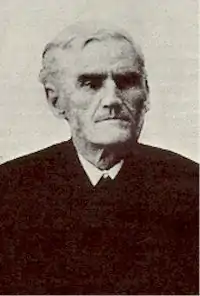William Orcutt Cushing | |
|---|---|
 William O. Cushing | |
| Born | 31 December 1823 |
| Died | 19 October 1902 (aged 78) Searsburg, New York, United States |
| Spouse | Hena |
| Religion | Christian |
| Church | Unitarian |
| Writings | 300 Hymns |
Offices held | Unitarian minister |
| Title | Pastor |
William Orcutt Cushing (31 December 1823 – 19 October 1902) was an American Unitarian minister and hymn writer from Hingham, Massachusetts.
Personal life
Cushing was born in 1823 in Hingham to Unitarian parents.[1] When he was a teenager and started to read The Bible alone, he became a follower of the Orthodox Christian school of thought. When he was 18, he stated that he felt that God wanted him to become a minister.[2]
Cushing remained true to Christian principles throughout his life. He once gave all of his life savings of $1,000 (approximately $18,400 in 2013) to a blind girl in order for her to receive an education.[3]
Ministry
Cushing started his training to become a Unitarian minister based along his parents' theology.[4] His first posting as an ordained minister was to Searsburg, New York, west of Trumansburg. There he met his future wife, Hena,[1][5] and they were married in 1854. In the same year, Cushing wrote his first hymn, "When he Cometh",[2] based on Malachi 3:17, for children in his Sunday School.[6]
Cushing then later went on to minister in a number of locations around New York until 1870 when Hena died, requiring Cushing to return to Searsburg. Shortly afterwards, Cushing suffered from a "creeping paralysis" that caused him to lose his voice, requiring him to retire from the ministry after 27 years in it.[6]
Hymn writing
After having to retire from the ministry, Cushing asked God for something to do to occupy his time. He discovered he had a talent for hymn writing and made that a way to keep busy after work in the ministry.[6] Throughout the rest of his life, Cushing wrote 300 hymns including "The Name of Jesus" and "Home at Last".[1] In 1880, he co-wrote "Follow On" with Robert Lowry and W. Howard Doane. This hymn became popular and was associated with The Salvation Army; its tune was adopted by Scottish association football club, Rangers as the basis for their club anthem, "Follow Follow".[7]
Death
Cushing died on 19 October 1902 in Lisbon Center, New York. He was buried in the Jones Cemetery, near Searsburg.[1]
References
- 1 2 3 4 "William Orcutt Cushing". Cyber Hymnal. Retrieved 2013-04-05.
- 1 2 "William O. Cushing Sought to Follow Christ". Christianity.com. Retrieved 2013-04-05.
- ↑ Hooper, Wayne (1988). Companion to the Seventh-Day Adventist hymnal. Review and Herald Publishing. p. 253. ISBN 0828004250.
- ↑ Hall, Jacob Henry (1971). Biography of Gospel song and hymn writers. Pennsylvania: AMS Press. p. 51. ISBN 0404072267.
- ↑ Rogal, Samuel J. (1996). Sing Glory and Hallelujah! Historical and Biographical Guide to Gospel Hymns Nos. 1 to 6 Complete. Cornell University Law Library, Management Library: Bloomsbury Academic. p. 48. ISBN 9780313296901.
- 1 2 3 Osbeck, Kenneth W. (2002). Amazing Grace: 366 Inspiring Hymn Stories for Daily Devotions (2 ed.). Kregel Publications. p. 94. ISBN 0825493528.
- ↑ "Ibrox disaster memorial service". BBC Sport. 2011-01-03. Retrieved 2013-04-05.